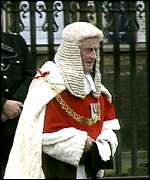Law Weblog
The prison debate…
Friday 2 February 2007 at 9:20 pm | In News | Post CommentIf we imprisoned offenders at the average rate (per 1,000 crimes) of EU members, the prison population would be 113,150 instead of 80,000.
Eight out of the fifteen members of the EU for which figures are available imprisoned offenders at a higher rate than England and Wales. The calculations are based on figures for 2003 (the latest available from the Council of Europe).
With a prison population in England and Wales of 80,000, if we imprisoned at the same rate as France, the prison population would be 91,113. If custody were used at the same rate as in Scotland, there would be 88,142 in jail.
Socialist Spain has the highest rate per 1,000 crimes and if her rate applied in England and Wales the prison population would be about 369,000.
Civitas report here
De Menezes judge – Lord Justice Richards – arrested over allegation of exposure
Tuesday 23 January 2007 at 7:24 am | In News | Post Comment Lord Justice of Appeal, Sir Stephen Richards last week sat in the Divisional Court of the High Court where he presided over the appeal into the death of Jean Charles de Menezes, the Brazilian shot dead at Stockwell tube station on 22 July 2005 by police officers who mistook him for a terror suspect.
Lord Justice of Appeal, Sir Stephen Richards last week sat in the Divisional Court of the High Court where he presided over the appeal into the death of Jean Charles de Menezes, the Brazilian shot dead at Stockwell tube station on 22 July 2005 by police officers who mistook him for a terror suspect.
Following a ruling in the Divisional Court the family can now ask the House of Lords to consider the case. Direct appeals from the High Court to the House of Lords bypass the Court of Appeal a process known as the “Leapfrog Procedure“.
Sir Stephen is the subject of an enquiry by British Transport Police into an incident that allegedly took place on a train in the London area last year; a commuter made a complaint to police that a man had exposed himself to her.
Wigs off…
Saturday 13 January 2007 at 11:46 am | In News | Post Comment We told you in September that judges would stop wearing wigs in civil cases; it appears that Lord Phillips the Lord Chief Justice told the judges on 12 January. It would follow that barristers would do likewise. This change will occur on 1 October 2007.
We told you in September that judges would stop wearing wigs in civil cases; it appears that Lord Phillips the Lord Chief Justice told the judges on 12 January. It would follow that barristers would do likewise. This change will occur on 1 October 2007.
Small change…
Sunday 7 January 2007 at 10:09 am | In News | 1 Comment Magistrates in Wales stopped Michael Rees from using 1p pieces to pay his fine of �650 for careless driving. After receiving 54,000 1p pieces, the court refused to accept any more, quoting the Coinage Act 1971, which states that bronze coins do not have to be accepted in settlement for debts of more than 20p.
Magistrates in Wales stopped Michael Rees from using 1p pieces to pay his fine of �650 for careless driving. After receiving 54,000 1p pieces, the court refused to accept any more, quoting the Coinage Act 1971, which states that bronze coins do not have to be accepted in settlement for debts of more than 20p.
Whole story here
Smoking and bail
Monday 1 January 2007 at 12:01 pm | In News | 1 CommentIt is well reported that 2007 is going to be the year of no smoking, the age for buying tobacco will increase to 18 and smoking in some public places will be banned. Smoking on hospital premises (outside wards with open windows) will also be prohibited. 
Other less well reported changes include changes to bail conditions, as from today – 1 January 2007 – the bail provisions in Sec 14 and 15 of the Criminal Justice Act 2003 take effect. They are only for offences that carry a life sentence and are committed after today.
A defendant 18 and over may not be granted bail unless the court is satisfied that he will not commit an offence while on bail, if he committed the alleged offence whilst already on bail. Also, he will not get bail if he has failed to appear in court on a previous occasions.
But for those under 18 the rules are softer, so failing to appear becomes failing to appear and not doing so as soon as possible after. This only applies to bail from the court, not police bail.
The Chilean dictator General Augusto Pinochet died aged 91 this month
Thursday 21 December 2006 at 10:54 pm | In News | 1 CommentIn December 1998 the House of Lords voted in favour of Pinochet’s extradition to answer torture charges against Spanish citizens; two voted against three voted for, including Lord Hoffman.
However, Lord Hoffmann had failed to disclose that since 1990 he had been an unpaid director of Amnesty International Charity Limited and his wife Gillian had worked for Amnesty for 21 years.
Amnesty had campaigned for Pinochet to be brought to justice and because of Hoffmann’s links; the Law Lords’ decision was set aside.
Reversing a House of Lords judgment in this way was unprecedented; reversing is normally exercised by a higher court over the judgment of a lower court.
Eventually the Law Lords ruled that Pinochet should face extradition. But in March 2000 the then Home Secretary, Jack Straw ruled that Pinochet should be released on medical grounds. He returned to Chile. Pinochet ruled the South American country from 1973 when he seized power in a military coup during which elected president Salvador Allende was killed. He remained in power until 1990.
Between 1973 and 1990 more than 3,000 Chileans were killed and thousands tortured. He was arrested in London in 1998 but he avoided lengthy attempts to extradite him to Spain to answer torture charges against Spanish citizens.
Baroness Thatcher remained loyal to Pinochet and pressed for his release after his arrest in London in 1998 because he alone had remained loyal to the UK during the Falkland Campaign. Margaret Thatcher would not have spoken up for him if she had believed him a monster in any event the legal case against him was weak and the motivation of those involved suspect.
UK Statute Law now freely available
Wednesday 20 December 2006 at 11:15 pm | In News | Post CommentFor the first time an official, authoritative online database of revised UK primary legislation is available free of charge to the public, the Department for Constitutional Affairs announced today.
The Statute Law Database can be found at www.statutelaw.gov.uk.
Baroness Cathy Ashton said:
“Citizens should have access to the laws of the land by which they are governed. The Statute Law Database provides an authoritative and easy-to-use historical database of UK statute law. I hope it will be welcomed as a useful tool for professionals who need to keep up with changes to the law as well as those who simply have an interest in historic and current legislation.” The database offers users a range of advanced search and navigation functions across over 30,000 items of UK primary and secondary legislation. The database contains primary legislation that was in force at 1 February 1991 and primary and secondary legislation that has been produced since that date.”
An amazing resource but the database must be treated with respect; for example the Industrial Tribunals Act 1996 was renamed the Employment Tribunals Act but finding which act made the amendment takes skill. Similarly, tracking down which articles were added to the police power of stop and search leads to “any article to which subsection (8A) below applies” which is not terribly helpful further research is only for the brave. In the same section it is also easy to miss is “(e) offences under section 1 of the Criminal Damage Act 1971 (destroying or damaging property)”. The amendments to burglary have not yet been made and so they have missed out: “In section 9 of the Theft Act 1968 (burglary), in subsection (2) omit “or raping any person” (removed by the Sexual Offences Act 2003). So, beware you have been warned.
For students a good text book does it for you and you are not likely to need this otherwise wonderful resource.
Sir David Edmond Neuberger
Thursday 14 December 2006 at 10:58 pm | In News | Post CommentLord Justice Neuberger is to become the country’s youngest Law Lord at the age of 58. He replaces Lord Nicholls who retires in January. At 61 Lady Hale was previously the youngest Law Lord.
Neuberger LJ, was called to the bar in 1974, took silk in 1987, became a High Court judge in 1996 and Court of Appeal judge in 2004. Neuberger’s rise in the judiciary is one of the quickest. Lord Hoffmann spent 2 years in the Court of Appeal and Lord Saville three years before their elevation to the Lords.
Law making to watch, if it happens
Thursday 7 December 2006 at 12:02 am | In News | Post CommentThe Chancellor, in his pre-budget speech threatened to pass retrospective legislation to ensure the treasury did not lose billions of pounds in wrongly paid tax. The government recently lost a claim in the House of Lords in Deutsche Morgan Grenfell Group Plc v HMC of Inland Revenue, the proposed legislation will reverse the judgment. This is law making with a vengeance and will be fun to watch, we predict that banks and companies will not take this lying down.
MURDER, MANSLAUGHTER AND INFANTICIDE Project 6 of the Ninth Programme of Law Reform: Homicide November 2006
Monday 4 December 2006 at 9:37 pm | In News | Post CommentA huge report covering most of the homicide matters, in a nutshell says:
The law governing homicide in England and Wales is a rickety structure set upon shaky foundations. Some of its rules have remained unaltered since the seventeenth century, even though it has long been acknowledged that they are in dire need of reform.
A new Act should replace the Homicide Act 1957.
There should be, for the first time, clear and comprehensive definitions of the homicide offences and the partial defences. In addition, the new Act should extend the full defence of duress to the offences of first degree and second degree murder and attempted murder, and improve the procedure for dealing with infanticide cases.
Structuring the general homicide offences should be guided by the ‘ladder’ principle. Individual offences of homicide should exist within a graduated system or hierarchy of offences. This system or hierarchy should reflect the offence’s degree of seriousness, without too much overlap between individual offences. The main reason for adopting the ‘ladder’ principle follows is as Lord Bingham speech in R v Coutts [2006] HL that defendants should neither over-convicted nor under-convicted.
Other recommendations include: First degree murder Second degree murder Manslaughter Partial Defences reducing first degree murder to second degree murder.
If you must the full report is here.
Powered by WordPress with Pool theme design by Borja Fernandez.
Entries and comments feeds.
Valid XHTML and CSS. ^Top^